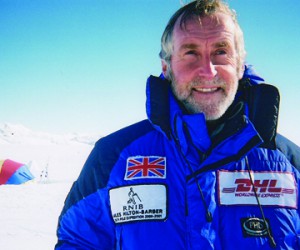While participating in an 11-day ultra-marathon in China, running through part of the Gobi Desert, world-renowned German athlete Stephan Schlect panted a profound thing to me: “For some people, a crisis in their life stops them from living – and for others, it gets them to start living,” he said.
Growing up, I thought there were two kinds of people in life: happy people (with no problems), and unhappy people (with problems). Then I realised that we all experience problems in life, and that our happiness and quality of life is not so much dependent on our circumstances, but on our response to them.
I lost my eyesight some 30 years ago to a genetic, hereditary eye disease. As my sight decreased, so did my quality of life, and I resigned myself to the fact that I could never again be really fulfilled or really happy due to my loss of sight.
Then an amazing thing happened: My brother Geoff – also blind through the same problem – set sail on his yacht from Durban to Fremantle, Western Australia, completely blind and totally alone. Fifty-one days and 4 300 miles (more than 6 920 kilometres) later, via the Southern Ocean, facing roaring forties and five days in a force 10 gale (which almost took his life), he became the first and only blind person in the history of the world to have sailed solo across an ocean. Everyone, including his friends, had told him it was impossible. But it wasn’t impossible – it just hadn’t been done before.
I realised then that I had made a number of wrong assumptions about life.
For one thing, 20/20 vision was not the secret to happiness, or everyone with good sight would be driving around grinning like Cheshire cats – which they do not do.
Louis Braille was blinded by a spiked instrument at the age of three and many years later he invented the Braille alphabet, giving millions of blind people the ability to read. Do you know what he used to make the raised dots on the paper? The very same spiked instrument that had blinded him.
Let me share with you a few life lessons I have started to learn in recent years:
Expect the unexpected
Things don’t always go your way in life. Read the biographies of people who have achieved great things in their lives, and you will find that they all experienced adverse circumstances, but they learnt to deal with them and keep going.
Never give up
I have had so many times recently when my body has wanted me to stop; for example, when I was climbing the frozen, scree-covered slopes of Mount Kilimanjaro at a height of 19 000 feet (5 791 metres) in the icy moonlight, crossing Antarctica, exhausted by pulling a loaded sledge over big sastrugi (ice ridges) when I could not see them coming, crossing the Sahara, Gobi or Qatar Deserts; running in the Siberian Ice Marathon, running through Death Valley with temperatures of 58°C in the shade …
It has seemed so easy to stop, and so hard to keep going – but Jon Cook, my sighted guide, and I have learnt that you can keep going long after you think you just can’t go another step further, either physically or mentally.
Dream, decide, plan and persevere
This is a basic life plan I often refer to. Whoever you are, whatever your circumstances, you can apply these to your life. In brief:
- Dream big to achieve big: I have never met a person who has dreamt small and achieved big things.
- Decide: Your dreams remain just that, until you make the decision to make them happen. Just start telling your friends your decision and start acting on it.
- Plan: If you fail to plan, you plan to fail; plan your work, and work your plan.
- Persevere: Expect the unexpected; don’t give up when circumstances change – adapt your plan, but keep your goal.
The circle of life
Draw an imaginary circle around yourself. This represents everything you have done with your life to date. Many people tell me their life is monotonous and that they are unfulfilled. While participating in the Marathon Des Sables, where competitors had to run five-and-a-half marathons in six days across the Sahara Desert, carrying all their food, equipment and supplies on their backs, Jon read to me a legend that was embroidered on the rucksack of a French runner: “He who is not willing to risk going beyond his limits should not complain about the mediocrity of his existence.” Wow! That hit me. “If you keep doing what you have always done, you will get what you have always got.”
Have a lot of fun in life
Life is serious enough without you and I adding to it, is it not? As they say, if you do not like something, change it – and if you cannot change it, change your attitude about it.
Fulfilment, after all, is the product of achievement, not inactivity, and I now focus on all the things I can do, rather than be regretful about the things I can no longer do. You should do the same. I think a sense of humour, and the ability to laugh at yourself and your situation at times is an essential attribute if you are going to fulfil your potential in life.
Your attitude to failure
Do you know that so many people around us are afraid of trying something new, in case they do not succeed the first time?
We all know about Michael Schumacher, the Formula 1 world champion. Do you know how he got there? Through the process of losing more races than he won over the years, but learning from every race he lost. Take the risk of winning.
At the end of my life, I will be more concerned about the things I have not attempted, rather than those I have. My definition of a winner is simply someone who gets up one more time than they fall down.
Remember, in most cases, the only limits in your life are those you choose to accept yourself.
Your quality of life, as I keep telling you, is determined not so much by your circumstances, but by your response to them. Remember: dream, decide, plan and persevere.
Read the full article in the March edition of Leaders in Wellness.






